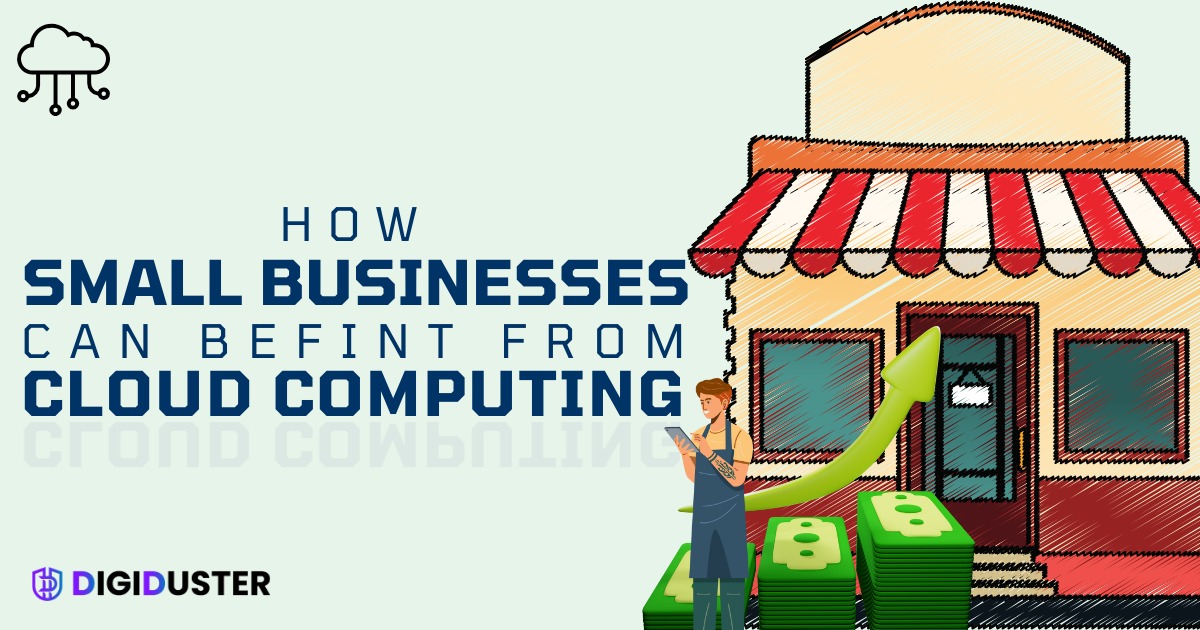In today’s fast-paced digital era, businesses of all sizes are adopting cloud computing to streamline operations, reduce costs, and enhance flexibility. According to recent studies, small businesses are increasingly leveraging cloud services, with an estimated 70% expected to transition to cloud-based solutions by 2025. This surge is driven by the demand for scalability, remote work adaptability, and data security.
For small businesses, which often operate with limited resources, cloud computing has become a game-changer, offering tools that were once only accessible to large enterprises. This blog explores the fundamentals, benefits, and future trends of cloud computing and its critical role for small businesses.
What is Cloud Computing?
Cloud computing is the delivery of various services such as storage, software, databases, and networking through the Internet. Instead of hosting and managing data on local servers or personal devices, businesses can access these services remotely via the cloud. This approach eliminates the need for expensive hardware, offering a cost-effective and scalable alternative.
What is Cloud Computing Used For?
Cloud computing serves multiple purposes, including:
- Data Storage: Securely storing and accessing large amounts of data from any device or location.
- Collaboration Tools: Enabling teams to work together in real-time, regardless of location.
- Application Hosting: Running software applications without requiring extensive on-site infrastructure.
- Backup and Recovery: Protecting business data with automated backups and quick recovery options.
- E-commerce Platforms: Hosting online stores to manage transactions and inventory efficiently.
How Do Cloud Services Store Their Data, and How Secure Are They?
1. Storage on Distributed Servers
Cloud providers use multiple servers across various locations to store data, ensuring redundancy and reliability. If one server fails, others maintain the data’s integrity.
2. Data Encryption
All data is encrypted during transfer and while at rest. This ensures that even if intercepted, the data remains unreadable without a decryption key.
3. Access Control
Cloud services use multi-factor authentication and role-based access to limit who can view or manage data.
4. Regular Security Audits
Cloud providers conduct frequent security assessments and comply with global standards like ISO 27001 to maintain trust.
5. Disaster Recovery Plans
Providers have robust disaster recovery systems to prevent data loss due to natural disasters or cyberattacks.
What Are the Benefits of Cloud Computing?
1. Cost Efficiency
Cloud computing eliminates the need for physical servers, reducing hardware and maintenance costs.
2. Scalability
Businesses can easily scale resources up or down based on their needs, ensuring flexibility without overspending.
3. Remote Access
Employees can access tools and data from anywhere, fostering productivity and supporting remote work.
4. Automatic Updates
Cloud services automatically update software and security patches, saving time and reducing vulnerabilities.
5. Environmentally Friendly
Shared resources in the cloud reduce energy consumption, contributing to sustainability.
Importance of Cloud Computing for Small Businesses
Small businesses face unique challenges, such as limited budgets, fewer IT resources, and the need to stay competitive. Cloud computing addresses these issues by providing affordable access to advanced technologies. It levels the playing field, enabling small enterprises to use tools that were previously exclusive to large corporations. Cloud solutions also enhance operational efficiency, allowing business owners to focus on growth rather than IT management.
Benefits of Cloud Computing for Small Businesses
1. Lower IT Costs
Small businesses save on the upfront cost of hardware, software licenses, and IT infrastructure.
2. Increased Collaboration
With cloud-based tools, teams can collaborate seamlessly, even when working from different locations.
3. Enhanced Security
Cloud providers offer robust security measures that small businesses cannot afford independently.
How to Become an Ethical Hacker in 2025: A Step-by-Step Guide
4. Business Continuity
Cloud backups ensure that data is recoverable even after unexpected incidents, minimizing downtime.
5. Flexibility and Scalability
Small businesses can adjust their resources on demand, making it easier to manage growth or seasonal fluctuations.
6. Access to Advanced Technologies
With the cloud, small businesses can leverage AI, machine learning, and big data analytics without the need for costly infrastructure.
Future Trends in Cloud Computing for Small Businesses
- AI and Machine Learning Integration: Small businesses will benefit from AI-powered tools for better decision-making and automation.
- Edge Computing: Combining local data processing with cloud capabilities will enhance speed and reduce latency.
- Hybrid Cloud Solutions: Businesses will increasingly adopt a mix of private and public clouds for enhanced security and flexibility.
- Serverless Computing: Small businesses can execute code without worrying about server management, improving cost-efficiency.
- Industry-Specific Clouds: Tailored cloud solutions for sectors like healthcare, retail, and finance will become more prominent.
How to Choose a Secure Cloud Service Provider
1. Evaluate Security Measures
Check if the provider offers encryption, firewalls, and compliance with security standards.
2. Review Data Backup Options
Ensure the provider offers automatic backups and disaster recovery plans.
3. Analyze Pricing Models
Look for transparent pricing without hidden costs, suitable for small business budgets.
4. Assess Scalability
Choose a provider that can scale resources as your business grows.
Top Digital Marketing Strategies Every Small Business Should Implement
5. Examine Support Services
Opt for providers offering 24/7 customer support to resolve issues promptly.
6. Read User Reviews
Check reviews and case studies to understand the provider’s reputation and reliability.
Final Thought
Cloud computing is revolutionizing the way small businesses operate, offering unparalleled benefits like cost-efficiency, scalability, and security. As technology continues to evolve, staying updated with cloud trends will empower small businesses to remain competitive. By choosing the right cloud provider, small enterprises can focus on innovation and growth, leaving IT concerns to the experts. Cloud computing is not just a tool but a strategic partner for success in the modern business world.



